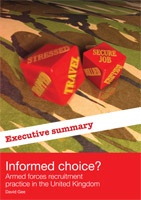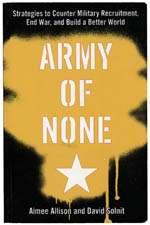recruitment
Informed Choice? Armed forces recruitment practice in the United Kingdom
November 2007

An independent report by David Gee, published in 2007, highlighting the risks posed to young people through joining the military, how young people from disadvantaged communities are targeted, how information available to potential recruits is often misleading and how the terms of service are complicated, confusing and severely restricting. The research found that a large proportion join for negative reasons, including the lack of civilian career options.
Army of None
2007

Strategies to counter military recruitment, end war, and build a better world by Aimee Allison and David Solnit, 2007 This is a book from the heart of the vibrant counter recruitment movement in the United States. It looks at the many ways in which schools and communities have become targets for military recruiters and how those schools and communities have responded - with a powerful movement that seeks to resist the militarisation of young people.
Britain’s child army
20/10/2010New Statesman
New Statesman
“Stricken by Iraq and low morale, the British army is on a desperate recruitment drive. Its new targets? Poorly educated teenagers and young schoolchildren.”
Watching, and challenging, the armed forces
20/10/2010Peace News
Peace News
This article looks at the challenges posed by new military recruitment strategies including the “army showroom” concept and the “Start Thinking Soldier” internet and TV advertising campaign – both “initiatives which utilise the language and tools of computer games and simulation, which young people immediately relate to, and desire.”
Army recruiters visit London’s poorest schools most often
January 2010
This research published in 2010 has found that the army visited 40% of London schools from September 2008 to April 2009 and disproportionately visits schools in the most disadvantaged areas. The researchers conclude that, “the army's recruitment activities in schools risk jeopardising the rights and future welfare of the young people contacted.
